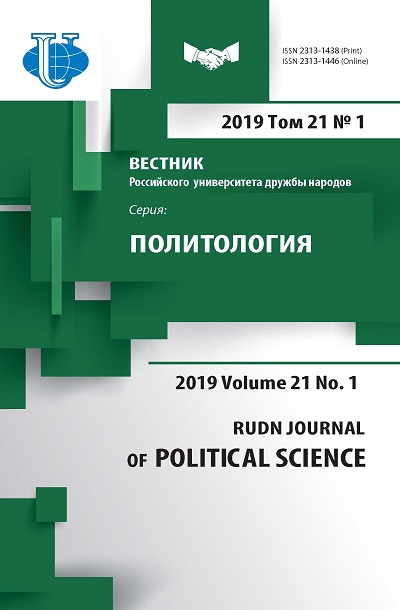THE IMPACT OF THE INTERNET ON THE DEVELOPMENT OF DEMOCRACY IN THAILAND
- Authors: Sathita D.1
-
Affiliations:
- Peoples’ Friendship University of Russia (RUDN University)
- Issue: Vol 21, No 1 (2019)
- Pages: 118-128
- Section: CURRENT PROBLEMS OF POLITICAL SCIENCE
- URL: https://journals.rudn.ru/political-science/article/view/20980
- DOI: https://doi.org/10.22363/2313-1438-2019-21-1-118-128
Cite item
Full Text
Abstract
The article examines the role and peculiarities of the internet in Thailand as well as its influence on the development of democracy in the country. At present, information technology is becoming an essential communication tool and the internet plays an important role in political communication. The author uses comparative political method to analyze the advantages and disadvantages of using the internet as a communication instrument in democratic society. Also, the article focuses on the function of the internet as an information transmission channel. The analysis results show that the main advantage of using the internet as a political communication tool is low cost of information distribution as well as allround access to various information sources. This encourages citizens to participate in political activities of the state. On the other hand, the mass distribution of the internet as the main source of information has its disadvantages: unreliability of data, wide access to false information and discordance of opinions. In Thailand, citizens do not have free access to the Internet, so it is doubtful that it will have a great impact on the development of democracy in the country.
Keywords
About the authors
Dejthongpong Sathita
Peoples’ Friendship University of Russia (RUDN University)
Author for correspondence.
Email: sathita_d@gmail.com
Trainee of the Department of Comparative Politics of Peoples’ Friendship University of Russia
Miklukho-Maklaya str., 6, 117198, Moscow, Russian FederationReferences
- Bogdanov D.V. Social Functions of the Internet. Vestnik Nizhegorodskogo Universiteta im. N.I. Lobachevskogo. Seriya: Sotsial'nyye nauki. 2011; 1 (21): 114—120 (In Russ.).
- Voskanyan A.G. The Transformation of Modern Social Political Life in The Scopes of Rising Communication Environment. RUDN Journal of Political Science. 2012; 2: 136—148 (In Russ.).
- Voskanyan A.G., Pochta YU.M. The Significance of Communication Means of the Internet in Contemporary Politics. RUDN Journal of Political Science. 2013; 3: 79—97 (In Russ.).
- Universal Declaration of Human Rights. Available from: https://www.lexilogos.com/declaration/ index.htm. Accessed: 20.02.2018 (In Russ.).
- Isabayev B.O. Internet as a Political Communication Tool: Development Trends. Vestnik Kazakhskogo Natsional'nogo Pedagogicheskogo Universtiteta imeni Abaya. Seriya: Sociologiya i Politologiya. 2010; 3: 46—52 (In Russ.).
- Karpov P.N. The Role OF New Media in the Political Communication: Internet as an Instrument of Setting the New Agenda. RUDN Journal of Political Science. 2013; 1: 137—149 (In Russ.).
- Mikhalyov YU.A. The Role of Internet in States’ Policy in Contemporary World. Vestnik Moskovskogo gosudarstvennogo lingvisticheskogo universiteta. Seriya: Obschestvennye nauki. 2015; 26: 147—154 (In Russ.).
- Opanasenko N.V. Measurements of Communication Links of Modern Political Communication in Internet. RUDN Journal of Political Science. 2015; 3: 82—85 (In Russ.).
- A Thai Was Sentenced to 35 Years in Prison for Insulting the Royal Family. Lenta.ru. 09.06.2017. Available from: https://lenta.ru/news/2017/06/09/taezsrok/. Accessed: 20.02.2018 (In Russ.).
- Turonok S. Internet and Political Process. Obshchestvennyye nauki i sovremennost'. 2010; 2: 51—63 (In Russ.).
- As Thailand Restricts Internet Freedom Cyber Activists Work to Keep an Open Web. The Conversation. 26.07.2017. Available from: http://theconversation.com/as-thailand-restricts-internetfreedom-cyber-activists-work-to-keep-an-open-web-80911. Accessed: 20.02.2018.
- Coleman S. E-democracy — What is the Big Idea? The Paper was commissioned by The Governance Team (Governance and Information). British Council; Manchester; 2005.
- Dorris G., White B. The Many Faces of News: From Main Stream Media to Cybermedia. Paper Read at a Meeting of the American Political Science Association. University of Illinois, Chicago; 1999.
- Freedom on the Net 2016. Freedom House. Available from: https://freedomhouse.org/report/ freedom-net/2016/thailand. Accessed: 20.02.2018.
- Hague B.N., Loader B.D. Digital Democracy: Discourse and Decision-making in the Information Age. London: Routledge; 1999. 296 p.
- Hill K.A., Hughes J.E. Cyberpolitics: Citizen Activism in the Age of the Internet. Lanham, MD: Rowan amp; Littlefield; 1998. 220 p.
- Norris P. Deepening Democracy via E-Governance; Chapter for the UN World Public Sector Report. Harvard University; 2003. 37 p.
- Noveck B.S. Paradoxical Partners: Electronic Communication and Electronic Democracy. Peter Ferdinand. (ed.) The Internet, Democracy and Democratization. London: Frank Cass; 2000: 19—35.
- Pongsawat P. Thailand and Internet Freedom 2016. Matichon online. 22.11.2016. Available from: https://www.matichon.co.th/news/366683. Accessed: 20.02.2018.
- Report on Internet Freedom Case Study in Thailand 2015. Thainetizen Network. 16.05.2016. Available from: https://thainetizen.org/2016/05/freedom-on-the-net-2015-report-thailand/. Accessed: 20.02.2018.
- Saengtongkum V. Media and Thai Society: Power of Internet. Mathichon weekly. 21.02.2017. Available from: https://www.matichonweekly.com/column/article_83663. Accessed: 20.02.2018.
- Tedesco J.C. Chapter 19: Changing the Channel: Use of the Internet for Communicating About Politics. Lynda Lee Kaid (ed.) Handbook of Political Communication Research. Mahwah; New York: Lawrence Erlbaum Associates; 2004. 541 p.
















